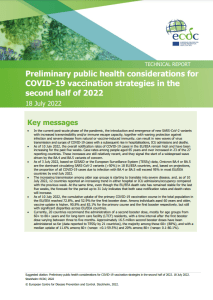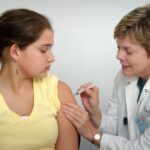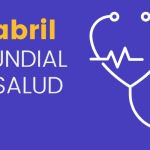Following the joint statement from the European Centre for Disease Prevention and Control (ECDC) and the European Medicines Agency (EMA) on 11 July 2022, ECDC has released Preliminary public health considerations for COVID-19 vaccination strategies in the second half of 2022. ECDC, in collaboration with the World Health Organization (WHO) Regional Office for Europe, has also published Operational considerations for respiratory virus surveillance in Europe.
Since 26 June 2022, the notification rates of COVID-19 cases in the European Union and European Economic Area (EU/EEA) remain high and have been increasing for the past 5 weeks. The rates among people aged 65 years and over increased in 23 of the 27 reporting countries. Though these increases are still relatively recent, they signal the start of a widespread wave driven by the BA.4 and BA.5 variants of concern (VOCs). Preliminary public health considerations for COVID-19 vaccination strategies in the second half of 2022 builds upon and complements the joint statement and guidance published earlier this year, on public health considerations and evidence on the implementation of a second mRNA COVID-19 vaccine booster dose.

Preliminary public health considerations for COVID-19 vaccination strategies in the second half of 2022 |
Currently, there is no evidence of increased severity of disease caused by BA.4 and BA.5 compared to the BA.1 and BA.2 VOCs, but increasing transmission among older age groups is starting to result in severe disease. As of 10 July 2022, 12 countries reported an increasing trend in either hospital or ICU admissions/occupancy compared with the previous week. Though the death rates in the EU/EEA have remained stable for the last five weeks, epidemiological modelling conducted by ECDC indicates that both case notification rates and death rates will increase.
Also, at this stage of the pandemic, the objective of COVID-19 vaccination campaigns should be to reduce COVID-19 hospitalisation, severe disease and death, and to protect healthcare systems. People over the age of 60 years and with underlying comorbidities remain at the greatest risk of severe disease. Mathematical modelling suggests clear benefits of an early second booster roll-out for protecting people over the age of 60 years. Therefore, an early second booster roll-out should be considered not only for the population aged 80 years and above but also for adults between the ages of 60 and 79 years and individuals with underlying conditions regardless of age to prevent severe disease and safeguard health system capacity. This would be particularly relevant and impactful in countries where the BA.4/5 wave is starting or has not yet peaked. Vaccination campaigns should also encourage eligible people to complete their primary series of vaccinations and first booster dose if they have not already done so.
The continuous monitoring of vaccines and their effectiveness is essential to rapidly detect signals of waning protection and the deployment of additional booster doses among population groups most at risk should be based on the local epidemiological situation.
At this stage of the pandemic, many countries are reconsidering their approach to COVID surveillance. With the Operational considerations for respiratory virus surveillance in Europe ECDC aims to provide the countries with concrete operational guidance for the transition to a sustainable integrated surveillance of respiratory viruses. The COVID-19 pandemic has had a lasting impact on existing systems designed for influenza. These systems and those established for SARS-CoV-2 during the COVID-19 pandemic, are not yet fully suitable for integrated respiratory virus surveillance. Countries should plan for a potential upscaling of testing for influenza viruses and SARS-CoV-2 if required in response to the emergence of a new SARS-CoV-2 variant of concern or influenza variant.
The public health considerations published today are based on the currently available scientific evidence and current epidemiological trends and will be periodically reassessed.

Coronavirus Present situation and vaccination in Spain |







Leave a Reply